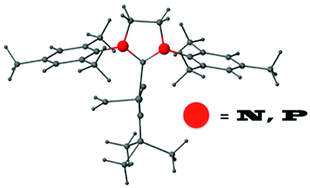Electronic bond tuning with heterocyclic carbenes†
Abstract
We discuss the impact of the nature of the heterocyclic carbene ring, when used as a complex forming

- This article is part of the themed collection: N heterocyclic carbenes
* Corresponding authors
a Dipartimento di Chimica e Biologia, Università di Salerno, Via Ponte don Melillo, Fisciano, Italy
b
King Abdullah University of Science and Technology (KAUST), Physical Sciences and Engineering, Kaust Catalysis Center, Thuwal 23955-6900, Saudi Arabia
E-mail:
Luigi.Cavallo@kaust.edu.sa
c
KemKom, 1215 Ursulines Ave., New Orleans, LA 70116, USA
E-mail:
jacobsen@kemkom.com
We discuss the impact of the nature of the heterocyclic carbene ring, when used as a complex forming

 Please wait while we load your content...
Something went wrong. Try again?
Please wait while we load your content...
Something went wrong. Try again?
L. Falivene, L. Caporaso, L. Cavallo and H. Jacobsen, Dalton Trans., 2013, 42, 7281 DOI: 10.1039/C3DT32923B
To request permission to reproduce material from this article, please go to the Copyright Clearance Center request page.
If you are an author contributing to an RSC publication, you do not need to request permission provided correct acknowledgement is given.
If you are the author of this article, you do not need to request permission to reproduce figures and diagrams provided correct acknowledgement is given. If you want to reproduce the whole article in a third-party publication (excluding your thesis/dissertation for which permission is not required) please go to the Copyright Clearance Center request page.
Read more about how to correctly acknowledge RSC content.
 Fetching data from CrossRef.
Fetching data from CrossRef.
This may take some time to load.
Loading related content
